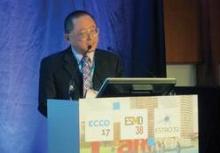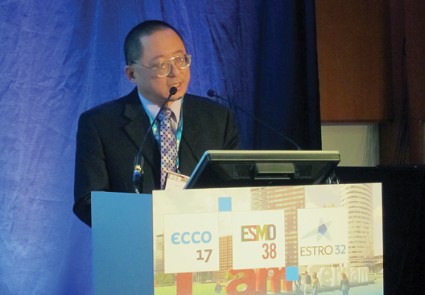User login
AMSTERDAM – The investigational second-generation ALK inhibitor alectinib produced objective responses in 54.5% of patients with ALK-positive non–small cell lung cancer refractory to crizotinib in a phase I dose-finding study.
Alectinib had consistent clinical activity in patients with symptomatic brain metastases, including two cases of leptomeningeal carcinomatosis. One of those patients, a 29-year-old woman with a 7-year history of anaplastic lymphoma kinase (ALK)–positive lung cancer, cleared malignant brain cells within 4 weeks after starting oral alectinib, Dr. Sai-Hong Ou said at the multidisciplinary European cancer congresses.
Alectinib, which is being developed by study sponsor Roche/Chugai Pharmaceutical, has already demonstrated an objective response rate of 93.5% in crizotinib (Xalkori)-naive ALK-positive non–small cell lung cancer. Among those patients, a previously untreated 2.5-cm brain lesion decreased in size by 47% in about 3 weeks and the patient continues to have a confirmed response to alectinib, he said.
Based on the new data, alectinib was granted a breakthrough therapy designation by the Food and Drug Administration to expedite its development and review.
Crizotinib is the only approved ALK-inhibitor for use in ALK-rearranged non–small cell lung cancer; it is available for use in any line therapy in the United States and as second-line therapy only in Europe.
A total of 47 patients were enrolled in the phase I study and treated with twice-daily alectinib at doses ranging from 300 mg to 900 mg. All patients had adenocarcinoma histology, an ECOG performance status of 0-2, and no prior exposure to other ALK inhibitors.
Two dose-limiting toxicities occurred at the 900-mg dose – a grade 3 headache and grade 3 neutropenia requiring dose interruption for 7 days. No patient had to be dose reduced at 600 mg twice daily, which was identified as the recommended phase II dose.
Overall, there were very few grade 3/4 treatment-emergent adverse events, said Dr. Ou of the Chao Family Comprehensive Cancer Center at the University of California Irvine Medical Center, Orange. Most were increased gamma-glutamyl transpeptidase, neutrophil decrease, and hypophosphatemia.
The most common toxicities were fatigue (30%), myalgia and peripheral edema (17%), elevated creatine phosphokinase (15%), and photosensitivity (13%).
Among the 21 patients with brain metastases at baseline, 13 had partial responses to alectinib at varying doses, 6 had stable disease, 1 had progressive disease, and 1 had a pending evaluation.
Dr. Ou said that a new 150-mg capsule has been formulated to reduce the number of capsules needed each day and that a phase II study (Accalia G2L) of alectinib is underway in crizotinib-resistant ALK-positive non–small cell lung cancer. A phase III head-to-head comparison between alectinib and crizotinib is also planned, with the protocol to be completed by January 2014, he said.
Roche/Chugai Pharmaceuticals sponsored the trial. Dr. Ou reported consulting for Chugai, Genentech, and Pfizer and serving on speakers bureaus for Boehringer Ingelheim, Genentech, and Pfizer.
The responses in patients with brain metastases, particularly in patients with leptomeningeal carcinomatosis, are good news as these patients can be challenging to manage. Also, the benefit on brain metastases could be directly linked to alectinib, since four patients had no prior brain radiation therapy. Two patients had brain radiation within a month of enrollment, and 15 had radiation more than 4 weeks prior to enrollment.
Crizotinib and the investigational second-generation tyrosine kinase inhibitor AP26113 are also active in brain metastases, however.
Alectinib is entering a crowded field that targets a niche area of lung cancer that represents less than 5% of all lung cancers. The drug’s favorable safety profile will be key versus the other competitors, but really what we need is biology to guide treatment.
Dr. Benjamin Besse of the Institut Gustave Roussy in Villejuif, France, was the invited discussant of the study. He reported no conflicts of interest.
The responses in patients with brain metastases, particularly in patients with leptomeningeal carcinomatosis, are good news as these patients can be challenging to manage. Also, the benefit on brain metastases could be directly linked to alectinib, since four patients had no prior brain radiation therapy. Two patients had brain radiation within a month of enrollment, and 15 had radiation more than 4 weeks prior to enrollment.
Crizotinib and the investigational second-generation tyrosine kinase inhibitor AP26113 are also active in brain metastases, however.
Alectinib is entering a crowded field that targets a niche area of lung cancer that represents less than 5% of all lung cancers. The drug’s favorable safety profile will be key versus the other competitors, but really what we need is biology to guide treatment.
Dr. Benjamin Besse of the Institut Gustave Roussy in Villejuif, France, was the invited discussant of the study. He reported no conflicts of interest.
The responses in patients with brain metastases, particularly in patients with leptomeningeal carcinomatosis, are good news as these patients can be challenging to manage. Also, the benefit on brain metastases could be directly linked to alectinib, since four patients had no prior brain radiation therapy. Two patients had brain radiation within a month of enrollment, and 15 had radiation more than 4 weeks prior to enrollment.
Crizotinib and the investigational second-generation tyrosine kinase inhibitor AP26113 are also active in brain metastases, however.
Alectinib is entering a crowded field that targets a niche area of lung cancer that represents less than 5% of all lung cancers. The drug’s favorable safety profile will be key versus the other competitors, but really what we need is biology to guide treatment.
Dr. Benjamin Besse of the Institut Gustave Roussy in Villejuif, France, was the invited discussant of the study. He reported no conflicts of interest.
AMSTERDAM – The investigational second-generation ALK inhibitor alectinib produced objective responses in 54.5% of patients with ALK-positive non–small cell lung cancer refractory to crizotinib in a phase I dose-finding study.
Alectinib had consistent clinical activity in patients with symptomatic brain metastases, including two cases of leptomeningeal carcinomatosis. One of those patients, a 29-year-old woman with a 7-year history of anaplastic lymphoma kinase (ALK)–positive lung cancer, cleared malignant brain cells within 4 weeks after starting oral alectinib, Dr. Sai-Hong Ou said at the multidisciplinary European cancer congresses.
Alectinib, which is being developed by study sponsor Roche/Chugai Pharmaceutical, has already demonstrated an objective response rate of 93.5% in crizotinib (Xalkori)-naive ALK-positive non–small cell lung cancer. Among those patients, a previously untreated 2.5-cm brain lesion decreased in size by 47% in about 3 weeks and the patient continues to have a confirmed response to alectinib, he said.
Based on the new data, alectinib was granted a breakthrough therapy designation by the Food and Drug Administration to expedite its development and review.
Crizotinib is the only approved ALK-inhibitor for use in ALK-rearranged non–small cell lung cancer; it is available for use in any line therapy in the United States and as second-line therapy only in Europe.
A total of 47 patients were enrolled in the phase I study and treated with twice-daily alectinib at doses ranging from 300 mg to 900 mg. All patients had adenocarcinoma histology, an ECOG performance status of 0-2, and no prior exposure to other ALK inhibitors.
Two dose-limiting toxicities occurred at the 900-mg dose – a grade 3 headache and grade 3 neutropenia requiring dose interruption for 7 days. No patient had to be dose reduced at 600 mg twice daily, which was identified as the recommended phase II dose.
Overall, there were very few grade 3/4 treatment-emergent adverse events, said Dr. Ou of the Chao Family Comprehensive Cancer Center at the University of California Irvine Medical Center, Orange. Most were increased gamma-glutamyl transpeptidase, neutrophil decrease, and hypophosphatemia.
The most common toxicities were fatigue (30%), myalgia and peripheral edema (17%), elevated creatine phosphokinase (15%), and photosensitivity (13%).
Among the 21 patients with brain metastases at baseline, 13 had partial responses to alectinib at varying doses, 6 had stable disease, 1 had progressive disease, and 1 had a pending evaluation.
Dr. Ou said that a new 150-mg capsule has been formulated to reduce the number of capsules needed each day and that a phase II study (Accalia G2L) of alectinib is underway in crizotinib-resistant ALK-positive non–small cell lung cancer. A phase III head-to-head comparison between alectinib and crizotinib is also planned, with the protocol to be completed by January 2014, he said.
Roche/Chugai Pharmaceuticals sponsored the trial. Dr. Ou reported consulting for Chugai, Genentech, and Pfizer and serving on speakers bureaus for Boehringer Ingelheim, Genentech, and Pfizer.
AMSTERDAM – The investigational second-generation ALK inhibitor alectinib produced objective responses in 54.5% of patients with ALK-positive non–small cell lung cancer refractory to crizotinib in a phase I dose-finding study.
Alectinib had consistent clinical activity in patients with symptomatic brain metastases, including two cases of leptomeningeal carcinomatosis. One of those patients, a 29-year-old woman with a 7-year history of anaplastic lymphoma kinase (ALK)–positive lung cancer, cleared malignant brain cells within 4 weeks after starting oral alectinib, Dr. Sai-Hong Ou said at the multidisciplinary European cancer congresses.
Alectinib, which is being developed by study sponsor Roche/Chugai Pharmaceutical, has already demonstrated an objective response rate of 93.5% in crizotinib (Xalkori)-naive ALK-positive non–small cell lung cancer. Among those patients, a previously untreated 2.5-cm brain lesion decreased in size by 47% in about 3 weeks and the patient continues to have a confirmed response to alectinib, he said.
Based on the new data, alectinib was granted a breakthrough therapy designation by the Food and Drug Administration to expedite its development and review.
Crizotinib is the only approved ALK-inhibitor for use in ALK-rearranged non–small cell lung cancer; it is available for use in any line therapy in the United States and as second-line therapy only in Europe.
A total of 47 patients were enrolled in the phase I study and treated with twice-daily alectinib at doses ranging from 300 mg to 900 mg. All patients had adenocarcinoma histology, an ECOG performance status of 0-2, and no prior exposure to other ALK inhibitors.
Two dose-limiting toxicities occurred at the 900-mg dose – a grade 3 headache and grade 3 neutropenia requiring dose interruption for 7 days. No patient had to be dose reduced at 600 mg twice daily, which was identified as the recommended phase II dose.
Overall, there were very few grade 3/4 treatment-emergent adverse events, said Dr. Ou of the Chao Family Comprehensive Cancer Center at the University of California Irvine Medical Center, Orange. Most were increased gamma-glutamyl transpeptidase, neutrophil decrease, and hypophosphatemia.
The most common toxicities were fatigue (30%), myalgia and peripheral edema (17%), elevated creatine phosphokinase (15%), and photosensitivity (13%).
Among the 21 patients with brain metastases at baseline, 13 had partial responses to alectinib at varying doses, 6 had stable disease, 1 had progressive disease, and 1 had a pending evaluation.
Dr. Ou said that a new 150-mg capsule has been formulated to reduce the number of capsules needed each day and that a phase II study (Accalia G2L) of alectinib is underway in crizotinib-resistant ALK-positive non–small cell lung cancer. A phase III head-to-head comparison between alectinib and crizotinib is also planned, with the protocol to be completed by January 2014, he said.
Roche/Chugai Pharmaceuticals sponsored the trial. Dr. Ou reported consulting for Chugai, Genentech, and Pfizer and serving on speakers bureaus for Boehringer Ingelheim, Genentech, and Pfizer.
AT THE EUROPEAN CANCER CONGRESS 2013
Major finding: Among the 21 patients with brain metastases at baseline, 13 had partial responses to alectinib at varying doses, 6 had stable disease, 1 had progressive disease, and 1 had a pending evaluation.
Data source: Dose-finding phase I study of 47 patients with crizotinib-refractory ALK-positive non–small cell lung cancer.
Disclosures: Roche/Chugai Pharmaceuticals sponsored the trial. Dr. Ou reported consulting for Chugai, Genentech, and Pfizer and serving on speakers bureaus for Boehringer Ingelheim, Genentech, and Pfizer.

